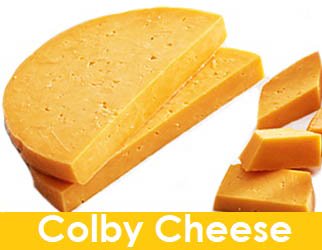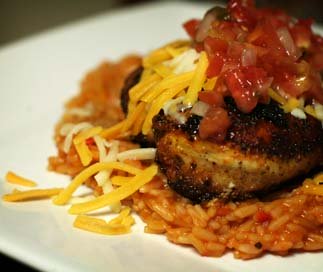Colby cheese
Colby cheese is semi-firm, washed-curd cheese that originated in the town of Colby, Wisconsin. It is made from pasteurized cow's milk, in a way similar to cheddar cheese.
However, unlike in cheddar cheese, where lactose is converted into lactic acid through increased acidification (cheddaring process), in Colby, it is washed in cold water to a level that permits lactic acid development to produce a desirable pH of 5.0 – 5.2.
 |
Colby cheese has higher moisture content and a softer body than cheddar cheese. It is also aged for short periods, which gives it a characteristic sweet to gently sharp, and tangy flavor (Mild and young cheddar-like) in contrast to the sharp character of Cheddar.
Manufacturing of Colby cheese:
Colby cheese must be made from pasteurized milk since it undergoes short aging periods to destroy pathogenic bacteria and reduce the population of other micro-organisms present, thereby promoting starter culture growth.
Cool to 31° C before adding starter and add Annatto food colorant.
Once the cheese milk is prepared, add liquid rennet to generate lactic acid from lactose, producing the casein coagulum.
Then cut the curd, and shortly after cutting the curd, stir and warm the curd whey mixture from 31 to 39° C for 30 min to release the whey from the curd. Gradually, increase temperature from 31 to 39° C. Heat slowly at first -no more than 1° C every 5 min.
Hold at 39° C until whey pH reaches 6.2 - 6.3 for 75 min. If the acidity is increasing too quickly, the temperature may be raised slightly to retard the activity of the culture.
Once the whey pH reaches 6.2 - 6.3, drain the whey down to the level of the curd.
To adjust Colby's final acidity, the curd is washed in cold water to remove lactose and acid. The whey is drained and replaced with cold water (15° C) to achieve a final mixture temperature of 26° C.
After washing, the curd is stacked and allowed to settle for 15 minutes. It is then salted for flavor and preservative effects, pressed into blocks and left to age for 1 to 3 months.
The cold-water treatment pauses the curd cooking and leaches the lactose from the curd. This washing step aims to reduce the amount of lactose to a level that permits lactic acid development to produce a minimum pH of 5.0 - 5.2.
"Longhorn" refers to the popular large cylinders of Colby. Sometimes cheesemakers form cheddar the same way. At the market, "Longhorns" are usually sliced into half-moons or sometimes even sticks.
Colby cheese Health benefits
Colby cheese is a high-calorie dairy item; 3.5 oz (100 g) holds 394 calories and 32.1 g of fats. Nonetheless, it is one of the finest sources of several nutrients including vitamin D and protein.
It is one of the finest sources of dietary calcium and phosphorous in the American diet; and together with vitamin D, it plays an important role in bone strengthening and growth, especially in children.
Colby provides high-quality protein that is rich in all essential amino acids needed for growth and development and helps stay healthy. 100g Colby contains 23.8 g or about 42.5% of the recommended daily intake of protein.
Colby contains a small amount of lactose making it one of the dietary sources of calcium for those with lactose intolerance. Since Colby is a washed-curd cheese, most of its lactose is removed while processing it.
Colby, being a dairy product, is free from gluten. In gluten-sensitive (Celiac disease) persons, it is another important source of gluten-free food items rich in protein, minerals, and vitamins.
During the ripening process, remnants of lactose, and other major milk constituents such as milk lipids and milk proteins, undergo biochemical changes into more easily digestible and health-benefiting products.
Colby is a very good source of fat-soluble vitamins, especially vitamin A. 100g of aged Colby contains 994 IU (33% of RDI) of this vitamin.
Colby is a dense source of minerals, especially calcium (68.5% of RDI), phosphorus (65% of RDI), zinc (28% of RDI), and selenium (26% DV).
| Principle | Nutrient Value | Percent of RDA |
|---|---|---|
| Energy | 394 Kcal | 19.7% |
| Carbohydrates | 2.57 g | 2% |
| Protein | 23.8 g | 42.5% |
| Total Fat | 32.1 g | 160.5% |
| Saturated fats | 20.2 g | 202% |
| Cholesterol | 95 g | 32% |
| Dietary Fiber | 0 g | 0% |
| Vitamins | ||
| Folates | 18 μg | 4.5% |
| Niacin | 0.093 mg | 0.6% |
| Pyridoxine | 0.079 mg | 6% |
| Riboflavin | 0.375 mg | 29% |
| Thiamin | 0.015 mg | 1% |
| Vitamin-A | 994 IU | 33% |
| Vitamin-C | 0 mg | 0% |
| Vitamin-D | 24 IU | 6% |
| Vitamin-E | 0 mg | 0% |
| Vitamin K | 2.7 µg | 2.2% |
| Electrolytes | ||
| Sodium | 653 mg | 43.5% |
| Potassium | 74 mg | 1.5% |
| Minerals | ||
| Calcium | 685 mg | 68.5% |
| Copper | 0.042 mg | 4.7% |
| Iron | 0.76 mg | 9.5% |
| Magnesium | 26 mg | 6.5% |
| Manganese | 0.012 mg | <1% |
| Phosphorus | 457 mg | 65% |
| Selenium | 14.5 mg | 26% |
| Zinc | 3.07 mg | 28% |
Buying
Colby cheese is readily available at many grocery stores all across the U.S. It is recognized as the official state cheese of Wisconsin, nonetheless, very popular in Mexican, Southwestern, and Tex-Mex cuisine.
Colby is a semi-hard American cheese prepared from cow’s milk. It is similar to cheddar cheese in color but softer and more elastic than cheddar with tiny holes called “eyes” that developed during the cold-water curd-washing process.
Colby-Jack cheese is a marbled cheese, in which Colby is often mixed with Monterey Jack.
In the stores, Colby is also sold in the form of large cylinders referred to as "Longhorns" which are usually sliced into half-moons or even sticks.
USFDA recommends Colby has 42.0% (moisture) and 29.0% (milk fat).
Always look for "best by date" on the package.
Storing
Colby has high moisture content and should be properly refrigerated for extended shelf-life at 35-40° F in a refrigerator drawer. After opening Colby cheese, wrap it in wax or parchment paper and then cover it with plastic wrap before refrigerating.
Properly stored, an opened chunk of Colby cheese will last for 3 to 4 weeks in the refrigerator.
If mold appears on a block of Colby cheese, cut away at least 1 inch around it and re-wrap and store the cheese adequately.
If mold appears in a package of shredded, or sliced cheese, discard it.
Food uses
The moisture and fat contents of Colby make it an excellent shredding cheese. It has good melting properties but should not be overheated, and hence, it is seldom used in cooking.
Colby is suitable as a table cheese, for grating and grilling, and in snacks and salads.
Here are some serving tips:
 |
| Shredded Colby-jack cheese on chicken and rice. Courtesy: Ginny |
Colby cheese can be melted into soup, sauces, chili, and stews to provide body and texture as well as a mild cheese flavor.
Shredded Colby cheese is most popular with Mexican and Tex-Mex dishes such as tacos, fajitas, and stuffed enchiladas, where it is commonly used as shredded.
Colby cheese, often garnished with pickles, tomatoes, and onions, is a preferred cheese eaten on fried bologna sandwiches .
Safety profile
Colby cheese is one of the very high saturated fats, cholesterol, and salty food items.
High sodium in the diet may cause water retention and elevated blood pressure.
Colby composes about 20.2 g of saturated fats and 95 mg of cholesterol (32% of DV)/3.5 Oz, making it one of the high saturated fat/cholesterol food items. Saturated fats raise your LDL (bad) cholesterol which increases the risk for heart disease and stroke.
Alternatively, low-fat or fat-free types of processed cheeses may be recommended for people on a diet.
(Medical Disclaimer: The information and reference guides on this website are intended solely for the general information of the reader. It is not to be used to diagnose health problems or for treatment purposes. It is not a substitute for medical care provided by a licensed and qualified health professional. Please consult your health care provider for any advice on medications.)
Also read ≻≻-
≻≻- Cheddar cheese nutrition facts.
≻≻- Cottage cheese nutrition facts.
≻≻- American Cream cheese nutrition facts.
≻≻- Back to Dairy products from Colby cheese nutrition facts.
≻≻- Back to Home page.
Further Resources:
USDA National Nutrient Database. (opens in new window).
Monterey Jack and Colby Canadian dairy Commission. (opens in new window).
United States Standards for Grades of Colby Cheese- pdf. (opens in new window).